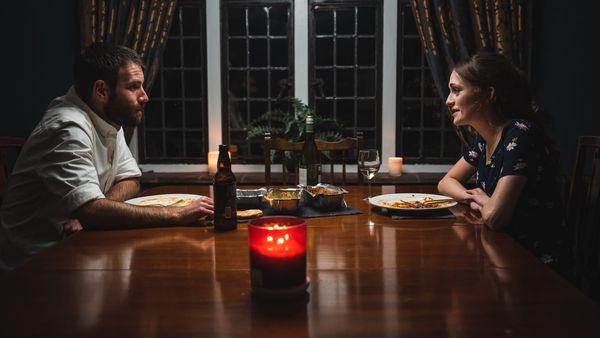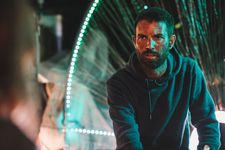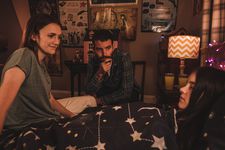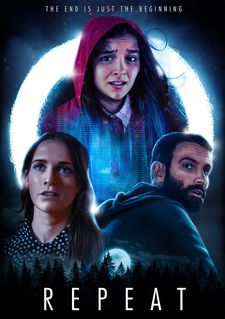 |
| Telling a human story in Repeat |
Recently screened at Sci-Fi London and now getting a digital release in the UK, Repeat is a great example of how a high concept film can be made on a small budget, and of how focusing on science doesn’t have to mean failing to focus on human stories. It stars Tom England and Charlotte Ritchie as a couple whose daughter (played by Ellila-Jean Wood) has gone missing. Whilst the girl’s mother deals with her grief in a very practical, down-to-earth way, psychologist Tom become obsessed with developing a machine which, he believes, could enable him to contact the spirits of people who have died – but how well does he understand his own work, and can anything prepare him for what will happen if his search is successful?
The film was developed by the creative team of Richard Miller (writer and director) and Grant Archer (cinematographer). They already had a few shorts under their belts and Richard co-directed 2008’s Pal (with John Watson), but this is their first feature together, and just to add to the complexity involved, it was shot during the height of the Covid-19 pandemic. Shortly after the festival, I met up with them to discuss how it all came together, and began be asking if they were longstanding science fiction fans.
 |
| Charlotte Ritchie in Repeat |
“Personally I’m just a massive film buff, across genres,” says Richard, “but growing up, that’s what was on TV. In the late Eighties and Nineties, a lot of my favourite things were, like, Quantum Leap and Red Dwarf and things like that, so for me, yeah, I have a deep passion for it, and probably some of my favourite films are sci-fi.”
“Yeah, similar really,” says Grant. “I grew up watching similar films to Rich. Science fiction is always very enjoyable to watch. It often takes you to a different time and place, it gets the brain going and gets you thinking about things differently, so making a science fiction film was always going to be an enjoyable experience.”
“It was a film started just very, very simply from a film about somebody who spoke to the afterlife, and then everything branched off from that,” Richard explains, “so it was a guy who could communicate with the afterlife but there’s loads of films that do it already and we wanted an original take on that. And I think it's fair to say that how we originally planned for the film to go, compared to the final two rewrites, is very, very, very different. You know, so much so that, when I came up with how we were going to end the film, I think it was like 11 o'clock at night,.” He looks across to Grant. “I dropped you a message on how it was, trying to explain it on WhatsApp message?”
Grant nods and explains that they clarified Richard’s idea the following day by telephone. “It was an evolution,” he says of the scripting process.
They've managed to keep the plot very tight, I note. Often films like this start out with a good idea but lose their way and don’t know how to bring everything back together. Was it a case of assembling pieces of a puzzle over time to get that to work?
“Yeah,” says Richard. “I mean, the build was pretty much written, start to finish, and then the main concept of what we were going to do, so getting the bones of that there. Then we changed whole swathes afterwards, to how we wanted the film to go. So it was a very, very much more straightforward, linear story until probably six months before the end of writing it. I think that's fair to say, isn't it? What we originally were going to make is a lot different from what we put on the screen.”
 |
| Tom England in Repeat |
“Yeah, that's it,” says Grant. “Story and narrative but also character development and backstories, etc. Yeah, it evolved over time.”
It’s very much a character-driven film, so how did they develop the individuals in their story?
“Everybody has a motivation,” says Richard. “You know, nobody's just evil for the sake of being evil. Everybody's trying to achieve something, from their own world view. And some of the actors brought that to the table as well, you know? We’d gone through a couple of rewrites and we're brought people on board. We went with Tom as our lead and he was he had some ideas around his motivation on why he has a certain view of what he’s doing. And it was always a case of the two leads having a very different perspective of what's happening in their lives at that time. Just having different perspectives for pretty much everybody in the film then brings this natural conflict.”
I tell him that I find it interesting as a story about grief because it takes account of the fact that people grieve in very different ways, and also because it isn’t exploitative – in particular, we don’t see Charlotte’s character falling to pieces and losing her capacity for reason, as grieving women frequently do in films.
“Yeah, definitely, he says. “That was definitely something that we thought about. We didn't want Charlotte’s character just to be a puddle of tears for the film. She has to have reasons for her views. As the film progresses, you see why she does things that she does, but she does have some agency. In a different film we could have swapped the sexes over and hopefully it wouldn't have made any difference. The lead could have been female. We couldn't have done that for this film for many reasons, but we wanted to make sure that these were human characters we could connect with. Because, as you say, everybody really approaches grief from their own perspective, and I think we wanted to show with that with the two leads.”
I was also interested in the way the film deals with the really strong protective instincts that parents have towards their children, and how they can sometimes interfere with good decision-making.
 |
| Powering up the machine |
“Not just connected to the child,” says Richard, “but I think that obsession was very much something that was a key for me with it. So whether it be a child or anything else, I think – Grant will probably back me up on this – I've got quite an obsessive personality myself (I can hopefully look back at my flaws and what that causes me to do) – that I tried to put into the characters, certainly Tom's character. So single mindedness or just being blind to things because you have tunnel vision was the sort of thing that I was thinking about from that perspective, regardless of it being a child. But grief, obviously, is another thing that amplifies that.”
Did they have the cast on board from early on with the project?
He nods. “I saw a trailer for a film that Tom was in called Cosmos really early on, before I even finished the script, and I showed it to you, didn’t I Grant?”
“Yeah,” says Grant.
“And luckily, Tom is right on our doorstep,” Richard continues. “I knew straight away that’s who I wanted for the lead, so we brought him on board very, very early. Tom had quite a lot of impact on the writing of the film. Then the rest of the casting: people joined the project, people left the project because of Covid and different things that happened throughout the summer, and then probably around June or July, we nailed down everybody else and we shot in October. So it was a very, very tight pre production schedule. But Covid had a big impact on the way that was made.”
It also impacted the film more widely, Grant explains.
“From pre production perspective it obviously impact us a little bit because we couldn't spend quite as much time doing all the test shoots that we had planned originally, testing lighting, testing different camera setups. We did do some but COVID disturbed our flow somewhat so we had to play catch up. The shoot itself, though was was obviously very, very challenging, as well. We were trying to we're trying to squeeze in quite a lot within the time frame, and also staying Covid safe as well. So, yeah, that was quite a challenge. We formed a bubble, as it were, for most of the cast and crew that were shooting over this two week block. So that also changed the dynamic in terms of how people worked together as well. We were spending a lot of time together, it wasn't just 9 to 5, it was extended hours, but working very, very closely as a collaborative team. So in some respects, Covid helped because it forced us into a situation where we found ourselves spending lots of time together during the shoot and it changed how we chose to work together.”
 |
| Parents facing difficult choices |
Did that help with the dynamic between the actors?
“Tom and Charlotte were very close for that period,” says Richard. “I think Charlotte was with us for nine days at the start, and they formed a very tight relationship with each other, and friendship. They’re very similar type of characters. But, you know, people had been inside for how many months, six months then? And this was the first chance a lot of people had to actually be with each other. So it was a little holiday. And also, I think it was a therapy session for certain people that were involved in the film, and they would openly say that. It was very much a cathartic little two or three week period that we had that helped some of us along an awful lot. It was a challenging period but we've got some great friendships off the back of it.”
On top of that, they were also breaking the old rule about not working with children. That, Richard tells me, actually went really well – but they learned a few things during the casting process.
“What we're never going to do again is to send out a Twitter shout asking for actors. We probably had – well, I know we had over a thousand applicants for all the roles, and we looked at every single one of them. But the children's roles were pretty much the most important because you know how a child actor can make or break your film. And I think for a film of our budget, scope and scale, we brought on some absolutely outstanding child actors and family that were involved in those as well, which made our life easy. Ellila was an absolute joy and professional to work with.”
Something that I really liked about the film was the design of the spaces in which Richard conducts his work, which reminded me of the places my physicist father used to work when I was a child. I ask if either of them has a background in that type of work.
“We’re both from an IT background,” says Grant. “Not scientists – or computer scientists, but we're not coding, we get projects and manage them. So yeah, I guess an appreciation for the world of science, but there may be some carry-over from our own own lives which has been amplified somewhat with the setting. Our homes don't quite look like the machine that was developed.”
“To say that, my garage is actually full of props at the moment that I need to get rid of,” Richard cuts in, laughing. “So yeah, it was, again, the aesthetic. I think the thing that we've learned most from our filmmaking over the last ten years, from making shorts etc., is production design, after your actors, is the next most important thing really. And we spent an awful lot of time designing how Ryan's garage would look, and what we could do in there. It was probably what we spent most time on with our production design.”
 |
| Repeat poster |
How about the design of the machine itself? We need to be convinced by it, but it can’t be too over the top.
“Yeah, we nearly did make it very over the top,” Grant admits.
Richard nods. “We actually engaged with some brilliant guys who are over in Birmingham that actually put together the robots for Robot Wars. And the machine was going to be very all singing all dancing. Covid, again, changed what we've done. It could have done a lot of extra things, but I think having that time to think about it, and the restrictions, we actually then pared down what we wanted to do and make it more realistic, and bring the viewer in. So I think, again, thinking time, and our pre shoot practices with what the machine may look like, really helps. I think your original idea is not always the best.”
“We did various sketch mock ups which sort of evolved,” says Grant. “We need to do a comparison between the finished article and the original concepts. But it's not too far away, actually. But that, I think, helped. During the creative process we were trying to determine how would it work in real life and it needed to feel practical, and feel like it was made from components that you might find, you know, in your house, or that would be easily accessible. So again, giving it that realism. But I think, certainly, doing that early design work helps that thought process.”
So they've been at the London Science Fiction festival? Was that something that they expected, and are there other film festivals that they submitted to?
“Yeah, we’ve submitted to a couple more,” says Richard. “And it depends, what happens, because some festivals won't let you enter if the film has already been released. So that's the balancing act. But I think the pre success of the release has been a massive surprise to us. You know, Grant came around here so many times when I was sitting with my head in my hands going, ‘Is this any good? What we’ve made, is it a decent film or not?’ So for it to get into London Sci-Fi, it was a massive, massive thing for us.
“I’m quite an emotional person from a filmmaking point of view. Every single nice word that’s said about the film, it really does have an effect. But you know, you've got to temper that, because you know when it’s released that you’re going to have people that don't enjoy it. You’ve just got to enjoy the highs and not take the hits too hard. But certainly, we were very, very happy about getting that. And the great people that were involved in the festival and the support they’ve given us since.”
So what's their plan now?
“We may make a short because they're easy to do in a short amount of time,” Richard says. “We're quite efficient. filmmakers, doing that, but we want to make another feature. I think anybody who was involved in what we’ve just done will want to be doing that again. There's nothing that really beats the audience seeing your film.”
Will be a similar genre, or something different this time?
“It will probably have – hopefully – something like that complexity. We’re toying with the sci-fi horror genre at the moment.” It’s a slow process though, he cautions, with multiple drafts necessary to produce a satisfying script, and a lot of ideas abandoned along the way.
If it results in something as good as Repeat, it will be worth the wait.
Repeat goes on digital release in the UK on Monday 15 November.





















